Boathook
Well-Known Member
It is low but then the weather for the last week has been very dull and misty and no real brightness so it doesn't surprise me.That seems low ,my 80 w panels each show 0,5A or 6w even on an overcast day in winter?
It is low but then the weather for the last week has been very dull and misty and no real brightness so it doesn't surprise me.That seems low ,my 80 w panels each show 0,5A or 6w even on an overcast day in winter?
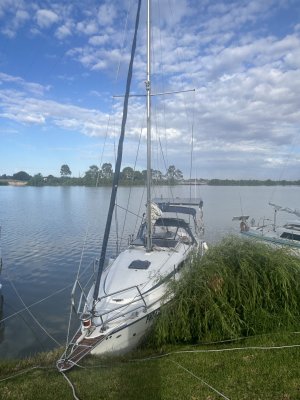
Just set his amp meter on his multimeter to 10ams and put it across the output whilst it’s disconnected. Instant amps readoutIs it fitted the right way up?
How are you displaying watts? Most use an ampere meter and volt meter. Rare to have a watt meter.
Good suggestion to bypass the controller temporarily to prove the panel works and that the controller is not to blame.
Is that a croc in the swamp in the background?So glad to live here in Australia not the gloomy UK!
Regardless an 80w solar panel is little more than a trickle charger for battery maintenance on anything but a bright clear sunny day.
Between rigging shading issues and general panel performance I rarely see better than 50 percent of quoted wattage from good quality panels unless conditions are near ideal.
We have over a 1000w fitted to a large cruising oriented trailer sailer.View attachment 187327
No Crocs on The Murray River in South Australia! Yes we have them in some fantastic cruising destinations in the far north of Australia. We are planning three months without resupply up in The Kimberley’s next year. The crocs up there can be half the size of our yacht!Is that a croc in the swamp in the background?
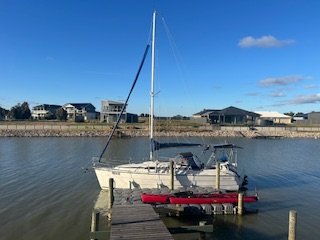
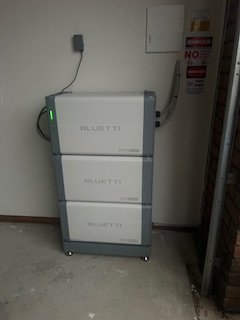
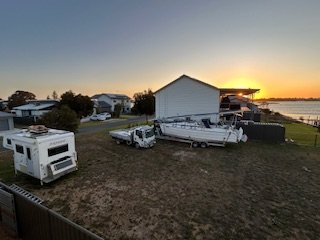
Grith,No Crocs on The Murray River in South Australia! Yes we have them in some fantastic cruising destinations in the far north of Australia. We are planning three months without resupply up in The Kimberley’s next year. The crocs up there can be half the size of our yacht!
Just adds to the excitement and challenge.
Down here in sunny Australia our house, camper and yacht can all run entirely grid independent on our solar and battery systems fitted to each of these. View attachment 187419
View attachment 187420
View attachment 187421
Hi JonathanGrith,
Happy New Year to you both, may it be healthy and successful.
I think you are correct with your 1,000 watt panel field (or thereabouts) even in sunny Australia - how people survive with less, in less sunny locations, is questionable. Despite ideas to the contrary 'sunny Australia' has bouts of not sunny, consecutive, days - it even rains and the 1,000 watts (or thereabouts) is essential.
But you obviously have a battery bank for 'not' sunny days - for you to be self sufficient what is the size of your battery bank?
You imply your home solar gives you self sufficiency - what solar do you manage to squeeze onto the yacht (and again what size of battery do you have?).
When you are up country - what happens to all those amps you farm - are you feeding to the grid? ...... or is your solar farm moveable, on the camper and yacht
Take care, stay safe
Jonathan
Oh dear me! “how people survive with less, in less sunny locations, is questionable”. I have 550 watts on the rail shared both sides. I can live off grid indefinitely in Portugal. Fridge on full time, tele on watching dvds as and when. Don’t skimp, it just all works.Grith,
Happy New Year to you both, may it be healthy and successful.
I think you are correct with your 1,000 watt panel field (or thereabouts) even in sunny Australia - how people survive with less, in less sunny locations, is questionable. Despite ideas to the contrary 'sunny Australia' has bouts of not sunny, consecutive, days - it even rains and the 1,000 watts (or thereabouts) is essential.
But you obviously have a battery bank for 'not' sunny days - for you to be self sufficient what is the size of your battery bank?
You imply your home solar gives you self sufficiency - what solar do you manage to squeeze onto the yacht (and again what size of battery do you have?).
When you are up country - what happens to all those amps you farm - are you feeding to the grid? ...... or is your solar farm moveable, on the camper and yacht
Take care, stay safe
Jonathan
Worked in Angola many years ago. The company finally bought us a leisure ski boat. We were on the banks of the river Congo. I helped build an oil field camp there! First time out we went up a creek where there was a sand bar between it and the Atlantic. Perfect for a bbq, beer etc. I could mono ski pretty good in those days. So of we went. I fell off whilst show boating in the middle of the creek. The thought crept into my mind! Crocs? We didnt know. The few minutes it took to get the boat back to me seemed for ever! Dangling feet played mind games with my head! I never did find out whether there were any crocs there! I did find out that there were what the locals called sea pigs, a manatee type of animal there after I saw one of the lads chewing on a cooked flipper!No Crocs on The Murray River in South Australia! Yes we have them in some fantastic cruising destinations in the far north of Australia. We are planning three months without resupply up in The Kimberley’s next year. The crocs up there can be half the size of our yacht!
Just adds to the excitement and challenge.
Down here in sunny Australia our house, camper and yacht can all run entirely grid independent on our solar and battery systems fitted to each of these. View attachment 187419
View attachment 187420
View attachment 187421
Yes we have two EcoFlow Delta Max 2 lithium Powerpacks (168ah each and with 240v 2400w inverters) and these are connected to 2 100ah lithium batteries in the yacht via an EcoFlow alternator charger. They provide both 240v and 12v power in the yacht. There is also a conventional cranking engine starting battery.Thanks Grith,
Interesting to know you move some of the units from land to marine - its a very cost effective option.
Good to get the detail for the complete systems - it would be useful data for anyone planning something similar or simply powering a yacht.
Jonathan
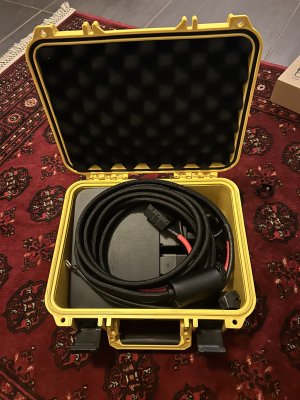
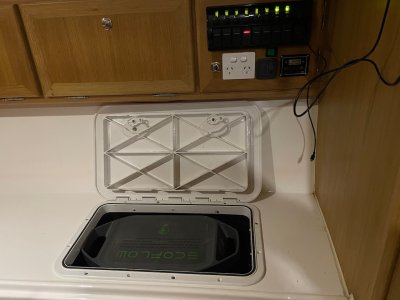
Much the same but our Jarcat 6 had 64w of solar panels back in 2000 and we were out cruising in The Whitsundays for 5 weeks and ran a compressor refrigerator, lights and other electricals off that and the tiny outboard alternator!Oh, how times have changed. Our first cruising yacht had 43W of solar (later upgraded to a whopping 75W) as the only charging source. We would regularly cruise for 6 weeks or more off-grid.
Luxury. And you try and tell the young people of today that, and they won’t believe you (apologies to Monty Python).
I'm impressed - you run a 'double burner' induction hob, fridge, deep freeze (big enough to freeze down a decent sized tuna), bread maker, desalinator for 2 showers each per day all off 550 watts of solar 24/7/months - and the sun shines 12/7/12 months (and only rains at night).Oh dear me! “how people survive with less, in less sunny locations, is questionable”. I have 550 watts on the rail shared both sides. I can live off grid indefinitely in Portugal. Fridge on full time, tele on watching dvds as and when. Don’t skimp, it just all works.
Oh dear me!I'm impressed - you run a 'double burner' induction hob, fridge, deep freeze (big enough to freeze down a decent sized tuna), bread maker, desalinator for 2 showers each per day all off 550 watts of solar 24/7/months - and the sun shines 12/7/12 months (and only rains at night).
Jonathan
Yes - its the 21st Century, (many have moved on from no showers and Fray Bentos meat pies) - all that the Century has to offer is available to you - and I suspect more will become available.Oh dear me!
In the 20th century, when I was a boy, a man used to come around the neighbourhood with a knife sharpener mounted on a bicycle. It seems his services are still required?Yes - its the 21st Century, (many have moved on from no showers and Fray Bentos meat pies) - all that the Century has to offer is available to you - and I suspect more will become available.
Jonathan
There is no definitive answer to this question. Our current boat is equipped with over 1,000 watts of solar power, enabling induction cooking, a refrigerator, a freezer, a watermaker, a washing machine, hot showers, etc.We are well into the 21st Century and technology has changed.
Jonathan